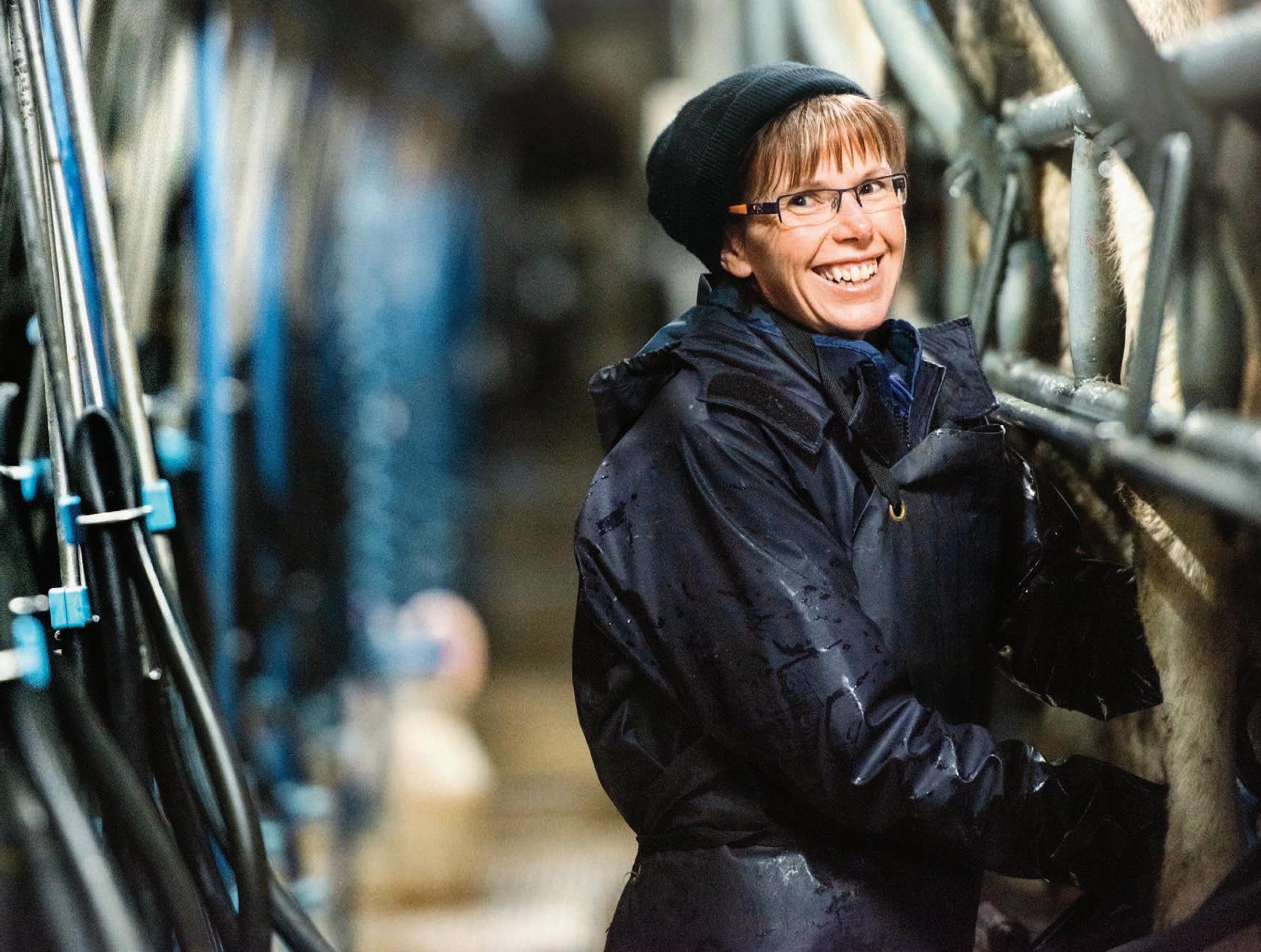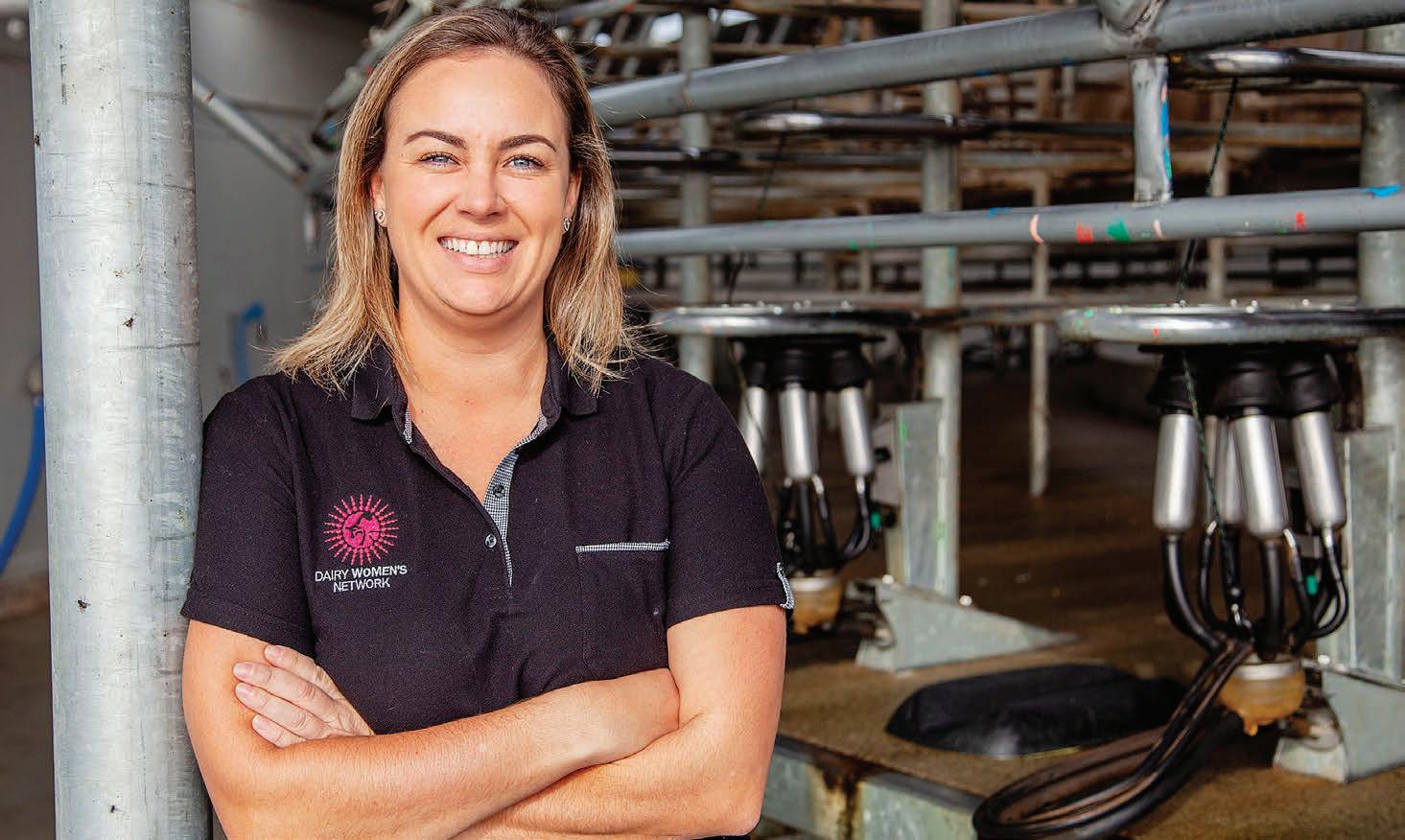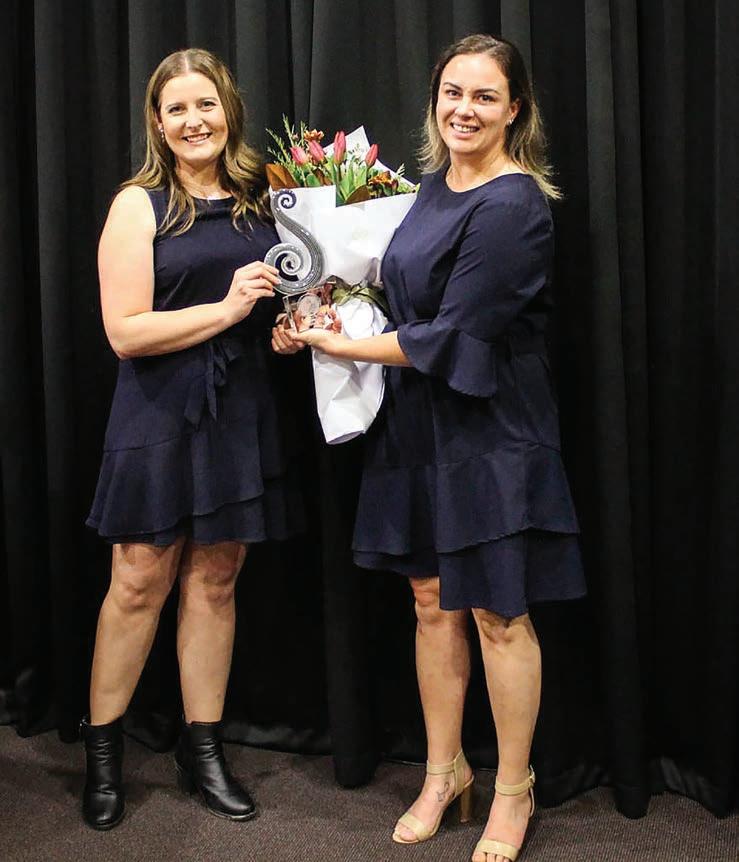
10 minute read
Dairy champion
from Dairy Farmer November 2020
by AgriHQ
Ngāi Tahu farm manager and Dairy Women’s Network member Ash-Leigh Campbell is the 2020 Fonterra Dairy Woman of the Year. Photo by Tony Benny
How a car started a farming journey
By Tony Benny
The 2020 Fonterra Dairy Woman of the Year had a shaky start to her first full-time job as a dairy farmer, but has stood firm to build an outstanding career.
When she took an years, and I feel it’s constantly evolving. in the high school newspaper for a relief afterschool job relief It has been a really exciting journey,” milker three days a week.” milking, Ash-Leigh 30-year-old Campbell says. When she turned up for the interview, Campbell’s only interest Growing up on a lifestyle block at farm owners Darryl and Sue Petheram, in dairy farming was to earn enough Greenpark near Lincoln, she had a pony confused by her name Ash-Leigh, were money to run the car her parents had and a pet lamb, but the closest she expecting a boy. given her. But less than 15 years later, came to cows was on the town supply- “They were like, ‘We’ve never had a she’s been named Fonterra Dairy type farms scattered around the district. female before’,” she recalls. Woman of the Year, the youngest ever When she was 16, her parents gave her But they showed her how to put recipient of the award. a car. the cups on in the 24-a-side herring
Campbell is technical farm manager “But there was a catch to it. They said, bone shed where they milked their 200 for Ngāi Tahu Farming, assisting with the ‘If you want to drive it, you’ll need to pay pedigree Holstein Friesians, and then she oversight and performance of 8000 cows for fuel, registration, WOF and tyres’,” she washed down the yard. on eight dairy farms and five support says. “Darryl said, ‘We won’t be offended units, at Te Whenua Hou (Eyrewell “I didn’t want to be a supermarket if you don’t want to come back, we Forest), North Canterbury. check-out chick like a few of my friends completely understand’,” she says.
“The role has grown and expanded as were doing for something like $6 an hour “I said it was fine and I’ll be back I’ve grown and expanded in the past four back then and there was a job advertised tomorrow.”
Pleased to be earning $14/hour rather than $6 in a supermarket, she kept the job for two years before enrolling at Lincoln University. But that didn’t go well.
“I basically just enjoyed the freedom, socialising, partying and after a year I thought ‘I don’t want to be here’ and the university didn’t really want me to be there either,” she says.
Keen to travel and needing funds to do that, she took a full-time job calf rearing for Trevor and Harriet Hamilton in Dunsandel and discovered she liked that much more than being a student.
“I think it was my care and attention to having healthy, thriving calves that led into a full-time opportunity as a dairy assistant,” she says, adding that her first day in that job was a lot harder than she could have imagined.
“September 4, 2010, the day of the first Canterbury earthquake, was my first day of full-time employment and we were pretty close to the fault line.
“We were herd testing that morning, but one of the workers had slept in and we couldn’t start without them so we
Continued page 30

At the age of just 30, Ash-Leigh Campbell is the youngest ever recipient of the Fonterra Dairy Woman of the Year title.
YOU PROVE IT EVERYDAY
Now it’s our turn

You measure your own performance at every milking. Our performance should be measured by our ability to support you, today and tomorrow.

That’s why we’d like to meet, face to face and talk through the most recent data and reports for your farm, so that you can plan your future with confidence.
It’s time to prove it

were all standing there in the shed at 4.30am and the earthquake hit at 4.35am and the lights and everything went out and we got thrown around.”
They couldn’t use the shed because the power was off and it took until 6pm to get things sorted and walk the herd down to a neighbour’s farm 6km down the road for milking and back again.
“So on my first day, I worked 23 hours. I always knew it would be tough entering the dairy industry, but I didn’t know my first day would be that hard or memorable,” she says.
She became part of the Dunsandel community and joined the local Young Farmers club and through the connections she made was offered a sole-charge job managing a 500ha dairy support unit near Sheffield.
“That’s where I think I found my grittiness,” she says.
“When I was a dairy assistant, out of 20 staff, I was the only full-time female when I started.
“I just kind of kept my head down and got on with it and it wasn’t until I moved into this next role, managing the young stock that I realised that I needed to work smarter not necessarily harder.
“So, playing to my strengths and seeking support where I had weaknesses, normally around that mechanical and physical side.
“I’d have the odd casual worker who’d come in to help, but I was looking after 100s of young calves and yearlings with Ash-Leigh Campbell’s first day of farming full-time was the same day the first Canterbury earthquake struck and she ended up working for 23 hours straight,

but it didn’t deter her. long days in the yards drenching and vaccinating by myself. Everything fell back on me, so if it wasn’t going to work, I had to fix it, I had to use my brain.”
At 24, she found herself at a crossroad. In her heart she wanted to go to Australia to work on a cattle station, but her brain told her that maybe she should go back to university – and then she was given some sage advice.
“A wise, old farmer next door, Peter Hedell of Glen R Angus stud, sat me down and said, ‘Look, the industry’s changing. Historically paperwork might not have been necessary but the way the industry’s changing you probably do need paperwork to back yourself’.’’
Campbell took the advice and returned to Lincoln University – once she’d convinced them she deserved a second chance there.
“I had to write a letter to the university to be let back in because I’d been excluded. They let me in after they saw I’d grown up,” she says.
Through her Ngāi Tahu heritage, Campbell was awarded a Whenua Kura scholarship, a scheme to encourage young Māori into land-based career paths.
“I’d grown up knowing I was of Ngāi Tahu descent through my mother’s side, but I had no active connection so now I know where I come from. I whakapapa to Puketeraki Marae, just north of Dunedin at Karitane,” she says.
Not only did she complete her studies for a Diploma in Agriculture, she also did a Diploma of Farm Management and then decided to study for a Bachelor of Commerce majoring in Agriculture as well.
“I worked out I could complete the BComAg in 18 months if I went straight to summer school because of the previous papers I’d done in my dippies, so I could walk away with two dippies and a degree after three-and-a-half years,” she says.
But by now she was being noticed and Ngāi Tahu Farming suggested that instead of going to summer school, she take an internship with them as their sustainability coordinator. She intended to go back to uni full-time after that summer job, but was persuaded to work part-time for Ngāi Tahu Farming and attend Lincoln part-time as well.
“My grades actually improved a lot when I had a foot in the university door and a foot in the real world because I was crossing everything over, I was doing real
life scenarios and then taking that back to the classroom and vice versa,” she says.
“And because of the role I was in, there was a lot of industry exposure and I started making connections and it started snowballing.”
Since her employment with Ngāi Tahu Farming, Campbell shifted roles and became their technical farm manager, working alongside the dairy operations manager in an increasingly complex business.
“It’s a cool role. I can be on the tools one day, like working in the yards with our heifers, (and) the next day I could be helping a farm manager prepare for an upcoming environmental audit.”
She’s also a member of the Dairy Women’s Network and chairperson of Young Farmers. When she was nominated for the Fonterra Dairy Woman of the Year, Campbell was flattered but had no expectations and was surprised to be named a finalist. With the country under covid lockdown, the awards event was held online.
“I made the effort to put on a dress, but actually I was sitting there with my woollen socks on, I didn’t need heels,” she says.
“My flatmate and I were sitting in front of the computer and then my name got called out. It was so crazy because here I was winning this prestigious award, just me and my flatmate in our house, in our bubble, during lockdown, in our nice dresses and our socks.”
Her prize is a $20,000 scholarship sponsored by Fonterra, but in a covidaffected world she is yet to decide what to do with it. She’s toyed with studying at an overseas university, but has come up with another idea.
“I’ve pitched the idea that I’d love to be dropped into one of our international markets – whether it’s China, Indonesia of Malaysia – and put on a lens looking back at New Zealand dairy; who really is our consumer, what do they think about NZ dairy products, what is their perception of NZ as a country?
“It would be a ‘money can’t buy experience’ at the age of 30 and to then return home and have the privilege of sharing that message with NZ dairy farmers and be like, ‘Stop giving yourselves a hard time, we’re actually doing really well’.”
As for the future, Campbell’s not making any plans.
“I wouldn’t be where I am today if I’d been set in my ways,” she says.
“I think in today’s environment you need to be as agile as possible, so I don’t know what the future holds and that’s really exciting because the world’s my oyster.
“I don’t want to say I’m going to be the CEO of a farming business or I’m going to go sharemilking with 1000 cows. I’d be happy with either of those options, but I think it comes down to where you are at that point in time, the people around you. You have got to be flexible.” n

Ash-Leigh Campbell missed out on the glitz and glamour of the awards night because of covid-19 but was presented with her award later.
Rethink how you milk

With the new revolutionary iCR+ Intelligent Cluster Remover from GEA.
Perfect for rotaries, herringbones, retrofits and new installs, the new iCR+ with EasyStart lift or pull vacuum activation helps you save time and labour, all while providing a consistent milking routine for both cow and operator.
Quick and easy to install, maybe it’s time to rethink how you milk? Call 0800 GEA FARM, or
your local dealer for a quote.
gea.com/new-zealand
Drive dairy efficiencies? We can help.










